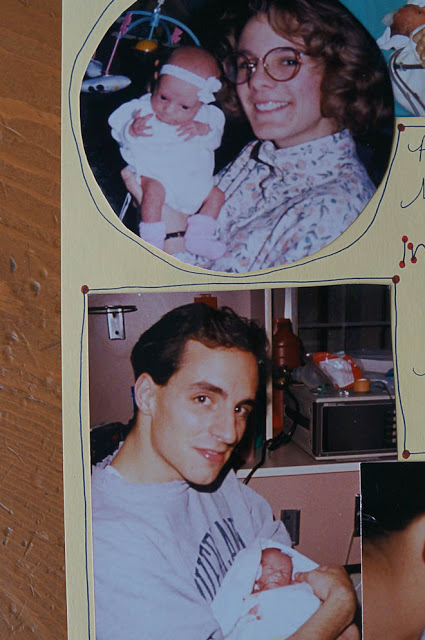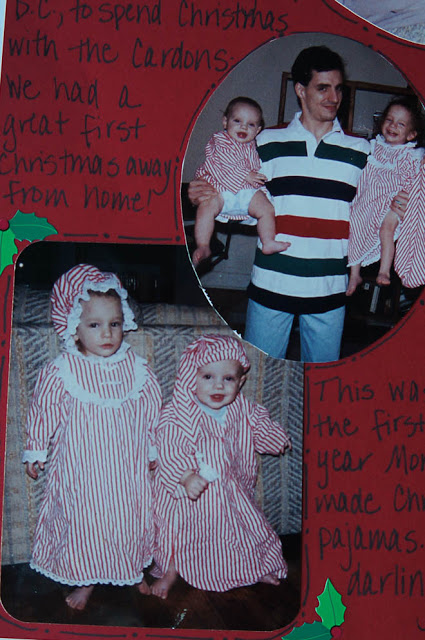If you missed part 1 of the story, click here.
So, what was I to do with this little bag of mine?
Just so you know, I am the farthest thing from a hoarder (unless you count books, but that's a library, right?). My personal philosophy of organization is that I would rather buy a new . . . anything . . . tomorrow than store it for a day. I'm usually ruthless in what I keep and what I toss.
Something about my diaper bag wouldn't allow me to let it go.
It sat on my laundry room counter for a few days, daring me to find a use for it that would justify me keeping it.
Then, it came to me.
I knew exactly what my favorite diaper bag could now be trusted with--my most precious memories of my babies' babyhood.
(Heidi took her box of baby stuff to Idaho with her, including her blessing dress this past summer. I was sad that I didn't have it home so I could include it with all of the rest.)
Little tiny beautiful clothes for each of my little tiny beautiful babies.**
Heidi--March 1991. She was three months old before we could bless her, since she spent 65 days in the NICU. Her soft blessing dress was intended to be short on a normal-sized baby, but she was about sixteen inches long and weighed only five pounds at the time. On her miniature frame, it looked like a long, grand gown.
Tucker Christian--July 1992. His legs were so fat that the crotch snaps barely held and his head was too big for the hat. I fell in love with the pintucks immediately.
Benjamin Andrew--June 1996. His was the first white ensemble made by my mother. It hadn't occurred to me to even ask her when Heidi and Tucker were born, and in hindsight, I wish she had made all of them. She pays such careful attention to detail and makes each outfit personal for the baby, and she tries to make it exactly as the mama wishes. His little head kept disappearing in the sailor collar that day.
Lily Jane--May 2000. When Mom came to help me after her birth, we spent quite a while at the store measuring lace and trim. I wanted this blessing dress to be perfect. And it was, down to the hand-sewn pearls and the lace trim on the slip that only Mom and I knew about. Lily's cousin Emma, born a few months later, has an almost identical gown.
Micah Thatcher--July 2004. The little baby boy with the twisted leg who healed a mother's broken heart. Grandma picked a shimmery soft fabric for him. I begged her to make him a hat to match, but it was so big that it was never worn. His outfit is the tiniest of the boys, which is good, because he was the tiniest of my boys, by a long shot.
Hyrum Kimball--May 2007. Something with Hyrum made me want to break out of the all-white box. Mom found this soft, textured baby blue fabric, and I knew this was the right one for him. She added the teeny blue buttons and hand-stitched detail to the collar and pockets, and I love how different it is from his brothers'. Six months later, when my friend was blessing her triplets, she borrowed Ben's and Hyrum's outfits for her boys. They are the only outfits to have been worn more than once.
And Eve Diana--November 2009. My final baby and I knew it. Named after my beautiful mother, I wanted her gown to be an extra special link to her grandmother, a dress like those of a hundred years ago. Her dress, a simple cotton, has all the details of a true artist--inlaid lace panels, cutout trim, and dozens of pintucks on the skirt. After her blessing, a friend's husband told me that it was the most beautiful blessing gown he'd ever seen. I agree. It's my favorite.
I knew this would be the perfect place to store these precious memories of mine. After gathering them from different closets and boxes in the house, I looked at them all and knew something was missing. There was one more thing I knew needed to be in that bag as well.
My Grandma Olsen crocheted this "baby afghan" (her words) when Heidi was born, and each of my children used it on their blessing days. Made of a rough acrylic yarn, it was spit up on, dropped in dirty parking lots, then washed and tucked away until the next baby's special day, good as new. It belongs with their clothes.
**(If you would like to read my children's birth stories, they are recorded on my blog. Click here to find them.)
So, what was I to do with this little bag of mine?
Just so you know, I am the farthest thing from a hoarder (unless you count books, but that's a library, right?). My personal philosophy of organization is that I would rather buy a new . . . anything . . . tomorrow than store it for a day. I'm usually ruthless in what I keep and what I toss.
Something about my diaper bag wouldn't allow me to let it go.
It sat on my laundry room counter for a few days, daring me to find a use for it that would justify me keeping it.
Then, it came to me.
I knew exactly what my favorite diaper bag could now be trusted with--my most precious memories of my babies' babyhood.
(Heidi took her box of baby stuff to Idaho with her, including her blessing dress this past summer. I was sad that I didn't have it home so I could include it with all of the rest.)
Little tiny beautiful clothes for each of my little tiny beautiful babies.**
Heidi--March 1991. She was three months old before we could bless her, since she spent 65 days in the NICU. Her soft blessing dress was intended to be short on a normal-sized baby, but she was about sixteen inches long and weighed only five pounds at the time. On her miniature frame, it looked like a long, grand gown.
Tucker Christian--July 1992. His legs were so fat that the crotch snaps barely held and his head was too big for the hat. I fell in love with the pintucks immediately.
Benjamin Andrew--June 1996. His was the first white ensemble made by my mother. It hadn't occurred to me to even ask her when Heidi and Tucker were born, and in hindsight, I wish she had made all of them. She pays such careful attention to detail and makes each outfit personal for the baby, and she tries to make it exactly as the mama wishes. His little head kept disappearing in the sailor collar that day.
Lily Jane--May 2000. When Mom came to help me after her birth, we spent quite a while at the store measuring lace and trim. I wanted this blessing dress to be perfect. And it was, down to the hand-sewn pearls and the lace trim on the slip that only Mom and I knew about. Lily's cousin Emma, born a few months later, has an almost identical gown.
Micah Thatcher--July 2004. The little baby boy with the twisted leg who healed a mother's broken heart. Grandma picked a shimmery soft fabric for him. I begged her to make him a hat to match, but it was so big that it was never worn. His outfit is the tiniest of the boys, which is good, because he was the tiniest of my boys, by a long shot.
Hyrum Kimball--May 2007. Something with Hyrum made me want to break out of the all-white box. Mom found this soft, textured baby blue fabric, and I knew this was the right one for him. She added the teeny blue buttons and hand-stitched detail to the collar and pockets, and I love how different it is from his brothers'. Six months later, when my friend was blessing her triplets, she borrowed Ben's and Hyrum's outfits for her boys. They are the only outfits to have been worn more than once.
And Eve Diana--November 2009. My final baby and I knew it. Named after my beautiful mother, I wanted her gown to be an extra special link to her grandmother, a dress like those of a hundred years ago. Her dress, a simple cotton, has all the details of a true artist--inlaid lace panels, cutout trim, and dozens of pintucks on the skirt. After her blessing, a friend's husband told me that it was the most beautiful blessing gown he'd ever seen. I agree. It's my favorite.
I knew this would be the perfect place to store these precious memories of mine. After gathering them from different closets and boxes in the house, I looked at them all and knew something was missing. There was one more thing I knew needed to be in that bag as well.
My Grandma Olsen crocheted this "baby afghan" (her words) when Heidi was born, and each of my children used it on their blessing days. Made of a rough acrylic yarn, it was spit up on, dropped in dirty parking lots, then washed and tucked away until the next baby's special day, good as new. It belongs with their clothes.
So many memories of special days and perfect babies.
Now they have a place where they can all be clean and safe and protected and together--a place where I can pull them out on occasion to shed some happy tears and be wrapped in my memories.
And they all fit inside as if the bag had been designed for this purpose all along.
**(If you would like to read my children's birth stories, they are recorded on my blog. Click here to find them.)

















































